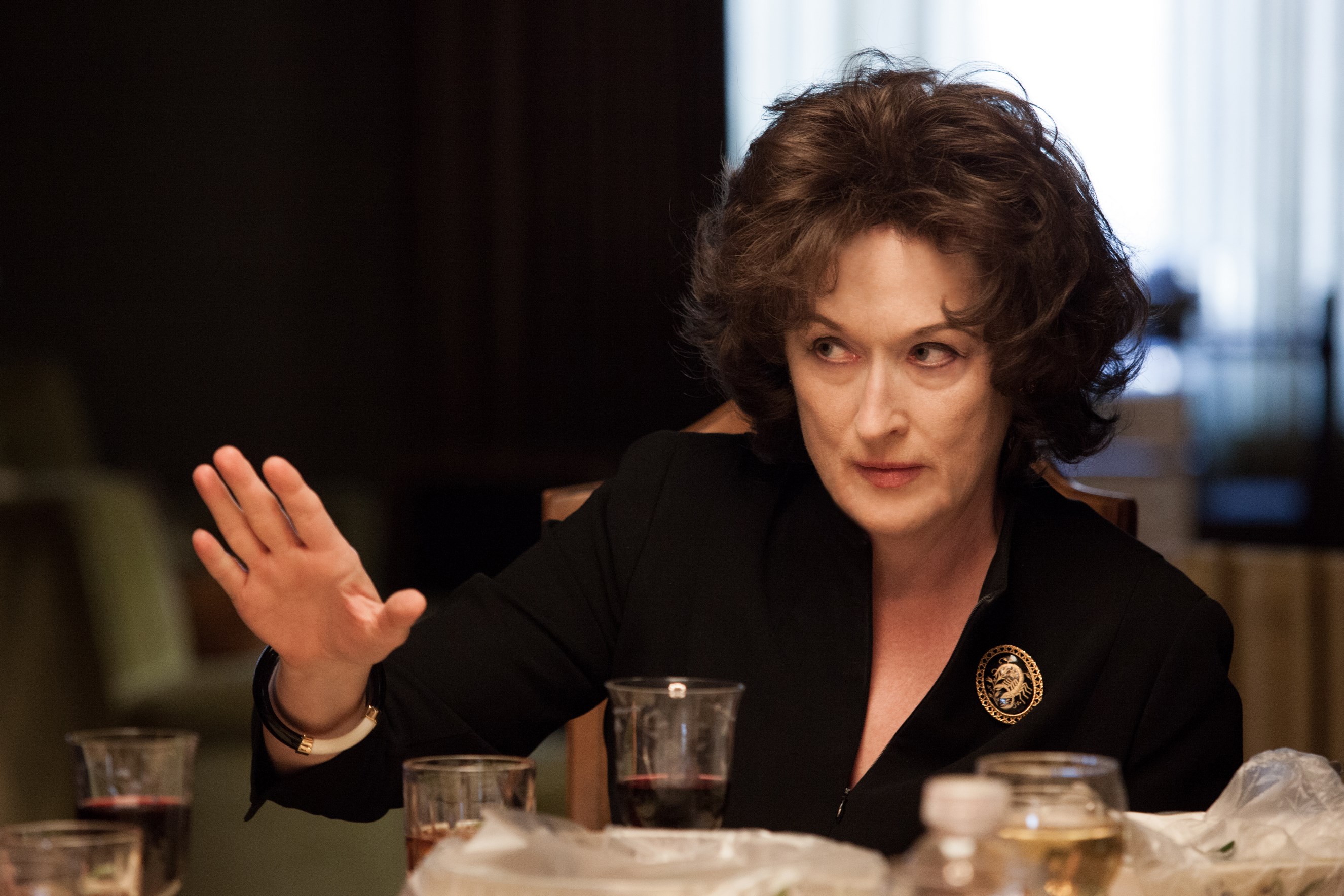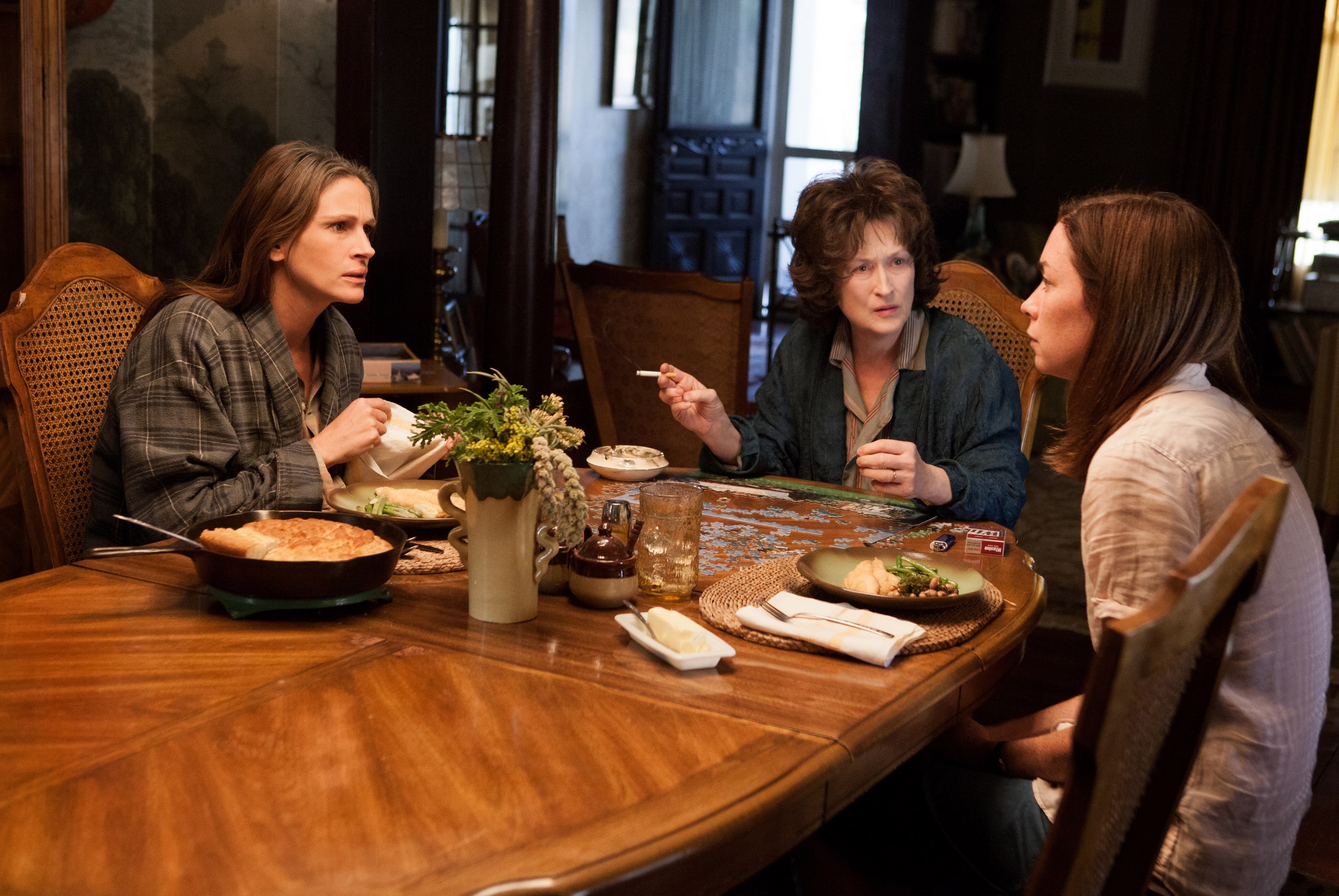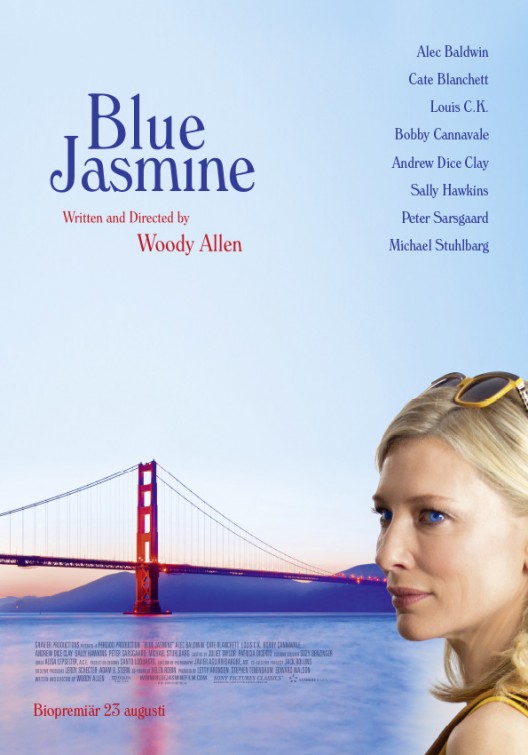August: Osage County is the neediest film that I have seen in quite a long time. It simply begs to be liked, does everything it can to make us fall for its charms. The screenplay is based on the Pulitzer Prize-winning stage play by Tracy Letts (who adapted it for the screen); it flaunts an intimidating array of high-octane, five-star, copper-bottomed acting talent, several Oscar winners and near-missers amongst their number. The script embraces the staple tropes of intelligent drama – domestic dysfunctionality, leavened by infidelity, envy, hubris, sibling rivalry, errant spouses, pot smoking and teenage angst amongst other things; it…actually, I’ve changed my mind. August: Osage County doesn’t want us to love it; it wants to browbeat us into submission, flipping sado-masochistic instincts into a brutal cinematic sadism. It’s a juggernaut, an 18-wheeler single-minded pitch for the Oscars. And by Jove, it darn well nearly succeeds too.

Osage County, Oklahoma, high summer. The temperature is hitting the 100s, and tempers are not too far behind. Beverley, patriarch of the Weston family (an unaffected cameo by Sam Shepard), was once an award-winning poet and teacher, but has washed his best days away with alcohol. Nothing left to look forward to in this world, he shuffles off stage-left to kill himself, after bequeathing responsibility for his wife to her new live-in helper, Johnna (Misty Upham, quite possibly more anonymous than intended). Said wife is the belligerent Violet (Meryl Streep), her acid tongue and abrasive manner little-improved by oral cancer and an incipient fondness for painkillers.
Beverley’s death brings his family together – in the best tradition of domestic dramas – in order to grant them leave to rip themselves apart. Barbara (Julia Roberts), the eldest, escaped the family nest as soon as she could, but has managed to find family trouble elsewhere with diffident husband Bill (Ewan McGregor) and typically non-compliant teenage daughter Jean (Abigail Breslin). Middle sister Karen (Juliette Lewis) – who one senses would have been turfed out had she tries to stay close to home – pitches up with new beau Steve (Dermot Mulroney), all flash and no substance, but certainly lots of trouble. She can’t stop talking about her impending nuptials, in the Caribbean on New Year’s Day next; judging from her forced gaiety, one gets the sense that she’s trying very hard to make sure her past remains a different country.

Then there’s Ivy (Julianne Nicholson, for me the best thing about the film), the one who stayed behind. Violet taunts her for not finding herself a man, but she remains stoically silent. Turns out that there’s a good reason for this. Seems she took the phrase kissing cousins a bit too literally, and has taken a shine to her first cousin, “little” Charles Aiken (Benedict Cumberbatch). Little Charles is the only child of Violet’s sister, Mattie Fae (Margo Martindale), every bit as horrid as her sister but with all her bile concentrated on her only child. Her husband, the older Charles (Chris Cooper) is an amiable buffer, but only effective up to a point.
This is all dry tinder stuck under a single roof in the wake of Beverley’s funeral, and it is inevitable that sparks will fly. Grief is a reliable catalyst for no end of trouble, after all, and Lord knows that we’ve ample material to play about with. The trouble is that it just doesn’t work. August: Osage County comes across as too contrived, too cynical to actually pull this viewer in.
One has to be fair, and give credit where credit is due. August… is visually an impeccable film, the combination of washed-out exteriors and the chiaroscuro contrast of gloomy interiors creating a suitably Gothic sensibility. The script is sharp: as is often the case with adaptations from the stage, it is at times a prisoner to its source material. But it moves the narrative along quickly nonetheless, acerbic one-liners and zingers keeping the needed qualities of variation and depth in place.
The real problem is in the question of balance. Much, indeed most of the acting is superb. Juliette Lewis is a bit overcooked, Abigail Breslin a bit complacent. (Lewis was once the finest young actor of her generation, but has never fulfilled her early potential. Breslin, who can be good, is rather bland here, and should take notes from her acting forebear.) Ewan McGregor is a bit so-so, too. I think he works best where his everyman mien provides an effective foil for the convulsions about him (The Ghost, for example).
And I think that, indirectly, is the problem with August: Osage County. There is simply way too much going on. Streep and Roberts are both magnificent, and I think that if the film had been stripped down to a generational two-hander – an existential conflict between a mother who thinks that she suffered in silence for too long, a daughter who sees more of her matriarchal lineage in herself than she likes or is comfortable with – it would have been an engaging and effective vehicle. But as it is, the secondary histrionics keep forcing themselves centre stage. At best, August: Osage County feels like an overcooked and self-conscious shot at the Oscars. At worst, it comes across as a competitive audition reel, a kind of cinematic celebrity X-Factor. By the time we get to the climax…actually, scratch that. The film climaxes so often, one might call it a multi-orgasmic experience. Which, as far as this film is concerned, is less fun than one might have thought it would be. Talk about being spoiled by good things.
Whilst on the topics of needy protagonists, Oscar buzz and compelling performances, it might be well worth your while catching a look at Blue Jasmine, the new Woody Allen film, if you haven’t had a chance to do so already. It’s not Allen’s best film, arguably not even the best of his “late” period. But it is a competent and efficient film, topped with a turn by Cate Blanchett that will certainly be recognised with at the least an Oscar nomination in a fortnight, and is a salutary lesson in how to shape films around a single performance.
The story is simple enough: Jasmine (Cate Blanchett), a Manhattan socialite and the privileged wife of a wealthy businessman, falls back on her uppers after her husband is caught doing naughty things with money that doesn’t belong to him. (There is an argument that this is the basis of money-management in general, but we won’t dwell on that point.) With no money, no home and no friends, Jasmine is forced to go and live with her sister, Ginger, in San Francisco, whilst she figures out what next to do with her life.
There is a catch, of course. Not so much the fact that Ginger (Sally Hawkins) inhabits a completely different social class to Jasmine, with the attendant embarrassments of a upper/working class interface; more pertinent is the fact that Jasmine’s husband had embezzled a windfall that Ginger and her (soon to be ex) husband had happened upon. Ginger says that she doesn’t blame her sister. She says she doesn’t. Ginger says she is happy to have her sister, critical and snobbish and judgmental in the very worst way possible, stay with her until she sorts herself out. She says she is happy about it. This, quite clearly, will not end well.
In a way, Blue Jasmine is as much film-making by numbers as August: Osage County. But whilst the latter ends up a hot holy mess, Blue Jasmine serves as a reminder of how efficient Woody Allen has always been as a film-maker, and how – paradoxically – he often pulls the best from his actors by simply letting them get on with things.
The supporting cast is efficient: Alec Baldwin as the thieving husband, Andrew Dice Clay as Ginger’s bitter ex; Bobby Cannavale as Chili, a car mechanic and Ginger’s wanna-be live-in boyfriend (he is usurped by Jasmine: needless to say, they start off on the wrong note and it all goes downhill from there); Louis C.K. as Al, who starts to woo Ginger and seems like an entirely more promising prospect for the kindly and good hearted woman.
Or is he? The thing that brings all the characters together in Blue Jasmine is the fact that they’ve become practiced at the art of telling themselves stories about who they are and what they want from life. Elsewhere, we might call these lies. This is no clearer than with Jasmine. Jasmine has cast herself as much a victim as everyone else, seeks to use this as a launch pad to reinvent herself. She gets a job, studies interior design online at night. She sees everyone around her as architects of their own failings. She is not like them, not one bit. She thinks.
It’s not a subtle performance at all, but it is so completely involved that it draws one in completely and totally. Likewise, the film: it takes a bit of time to settle down, but once the secondary players arrange themselves around Ms Blanchett, it becomes rather interesting, even amusing in a rather dark way. If one had to make a choice between the two films, I’d certainly plump for Blue Jasmine: much more modest, much less needy, but all the more rewarding for this.
August: Osage County (2013)
Directed by John Wells, Screenplay by Tracy Letts
Starring Meryl Streep, Julia Roberts, Ewan McGregor, Chris Cooper, Abigail Breslin, Benedict Cumberbatch, Juliette Lewis, Margo Martindale, Dermot Mulroney, Juilette Nicholson, Misty Upham and Sam Shepard
121 minutes, English w. Hebrew subtitles
Blue Jasmine (2013)
Written and Directed by Woody Allen
Starring Cate Blanchett, Sally Hawkins, Alec Baldwin, Andrew Dice Clay, Bobby Cannavale
98 minutes, English w. Hebrew subtitles.






